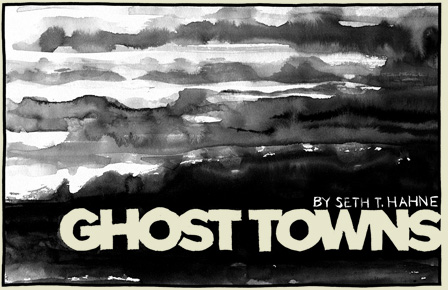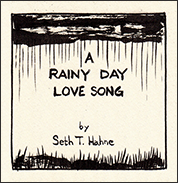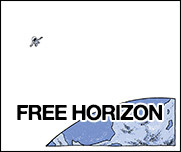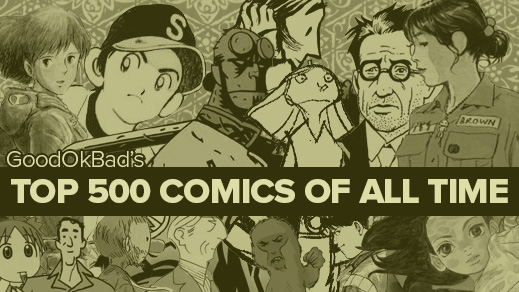

My Best 500 Comics Of All Time: Appendices
Metrics: DecadeMetrics: NationalityMetrics: Women
Want to support me?
There are basically a couple ways to support me, if that's something that sounds fun or valuable to you.
1) Through Patreon.
2) Check out my books/comics/art (most of it's free) and maybe buy something if you like.
Here's my latest comic, Ghost Towns. It's free and maybe you'll like it :)
Navel Gazing
Coming up with a ranked list of things for a personal site or post on Facebook is entirely different in nature from ordering things for a Serious Critical Outlet (which I vaguely pretend to be). I can't just post What I Liked because 1) I have a site mission to consider and 2) for the list to be recognized as worthwhile to most readers, it has to contain enough of those things that other people would list to seem legit.
And while I never cheer on popular books that I hate just for the concept of earning legitimacy (though I come close for including Watchmen), there's always a bit of artificial list reorganization that is maybe even subconsciously designed to appeal to a readership. And maybe I'll even bump up a smallpress indie book that you can't even buy because Man that makes it feel like I'm serious about comics and you should trust me. (By the way, I *am* serious about comics and you definitely *should* trust me.) But maybe I won't do that. Most of these motivations are present but subconscious.
Does the fact that I'm on friendly terms with some creators give those books a bump? I don't see how it couldn't, even if I'm not conscious of it happening. When you read a good book by a stranger, you think, "Hey that was good!" When you read a good book by a friend, your naturally warm feeling for that other person blends with your experience of the book (because nothing social occurs in a vaccum) and now you think, "Man, that was a good book! I loved it!" And of course friendship also tends to soften criticism as well. Because we're not robots, you and I.
Process: How this list was composed
Man, organizing this list was hard. I'm used to doing lists of 50 or 100 things. That's do-able, even if it gets a bit unweildy after 75 or so. But 500? I needed a way to organize.
So here's a video I put together for patreon backers a couple months ago. I'm a little sleepy in it, but you should get the idea.
Metrics: DecadeMetrics: NationalityMetrics: Women
Metrics: Decade of Publication
This is all going to be pretty much what we'd expect but let's map it out anyway.
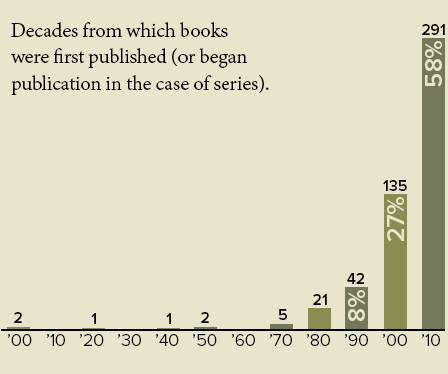
Why the massive fortification of books in the 2010s? Is it that more recent books are actually better? In some ways, yes?
I mean, it's not like there aren't books from the past that are every bit as good as today's best. Two of my Top 10 choices were from the '80s after all. And two more began in the '90s.
But I'll say two things:
1) Comics publication models that exist today allow more for the kind of comics I most value: comics that present interesting ideas in a story with a beginning, middle, and end. For the most part, we just weren't seeing that in 1950 (Eternaut and Princess Knight be damned). Instead, we got serial strips and serial adventures that had a beginning but no middle or end.
2) Comics didn't show a lot of interest in telling the kind of stories that I prefer. Which is fine. The comics storytelling buck does not stop at my desk.
3) In the modern era, until the '90s, American readers were mostly bound by what Marvel and DC wanted to put out—which were superhero adventure serials. Which just don't really interest me anymore (I was a superfan up until about 1993).
4) Beginning in the 2000-Aughts and then blossoming in the 2010s, we start seeing the influx of Japanese and European books with greater availability (though Europe is still a bit of a trickle).
5) Creators are actually learning, I think, from all the great stuff that came before them. This means the successful techniques, trends, and modes are available as a foundation for future tellers. Standing on the shoulders of giants and all that. The diversity of different comics traditions (such as is found in the manga and BD streams) has given a burst of inspiration to creators as well. Likewise, I don't doubt that some of the codification of comics storytelling techniques in books like Understanding Comics has helped in this—since I actually see those principles work to inspire students when I myself teach comics.
Metrics: National of Origin
These stats were made by the super-scientific means of Googling creators represented to try to figure out where they were born. In some cases, I had to make a best guess based on where they went to university and where they live and work. So, grains of salt and all that.
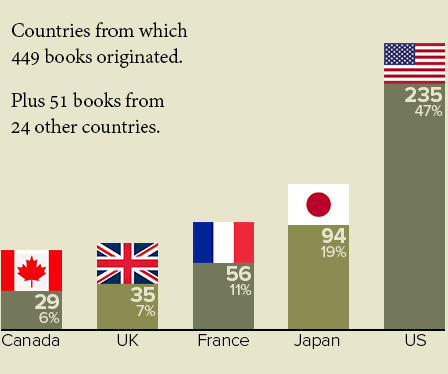
These results basically match expectation. Lots of American and Canadian creators feeding the US comics market. A smattering of British books making it across the Atlantic. Lots of Japanese work as well, since happily the manga boom-and-bust left both channels and interest wide open for publishers to bring over quality work. The Franco-Belgian scene accounts for most of the French, Spanish, and Italian creators. I'd love to see other nations' work better represented but the market and distribution channels just don't seem to be in place yet.
Metrics: Female Creators
Here I'll be talking about the role of female creators in this list vs their representations in my annual lists. Additionally, keep in mind that this is going to be my best guess as to the sex of creators, using Google and trying to do the best I can with limited time and resources.
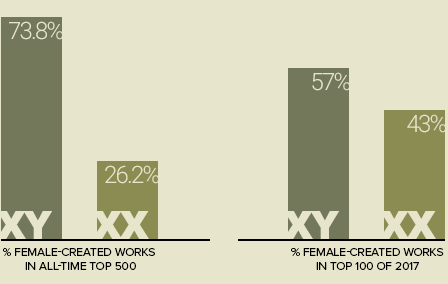
That 26% looks pretty grim when we look at the blanket fact that a little better than 50% of the world is women. And yeah, taken out of context, that only 26% of what I consider the best of the form utilize female creators is pretty atrocious. But there are two things that boost my optimism about that number: 1) 20 years ago, that number would've been far smaller, and 2) the 2017 numbers demonstrate that things are shifting toward the kind of parity we'd expect. Also, and maybe this is an unfounded third positive note (in a backwards sort of way): I can't back this up with data, but my guess from just glancing around is that there are still at this time more men making comics than women. That's changing, but anecdotally that's where I believe we are.
I think eventually, we'll get closer and closer to parity. I'd imagine that a top 250 list culled strictly from the decade 2020 - 2029 will see a near 50/50 split as more women join the ranks of comics creators. But for now and for a history-wide survey, men defnitely have a head start.
Comics is, roughly, a young medium with barely a hundred years to its name. And for the bulk of that, the large portion of the primary producers of comics have been men. So let's explore a simple example to help explain the dilemma.
I don't know the actually numbers but let's posit something at least plausible on the face of it. Suppose that in the last century, we've had 50,000 graphic novels or comics runs created by men. Suppose simultaneously that in the last century we've had 3000 of the same created by women. Now, from what we know, most of everything produced is going to be no better than fair with a lot of it being weak. Maybe only 1% of all creative works are actually great.
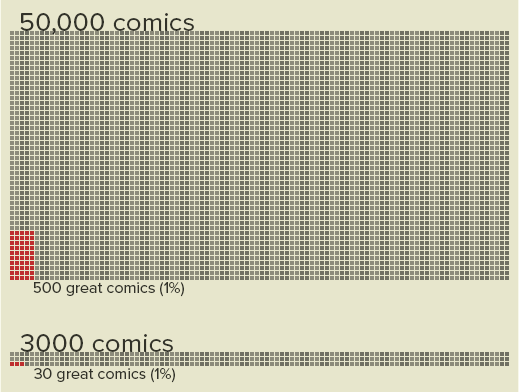
So all things being equal, women will naturally have fewer "greats" in circulation by simple virtue of having fewer books in circulation. Now, let's spread those 30 books amongst the 500 other great books.
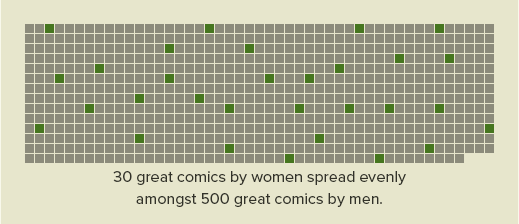
At this point it should be easy to see that if one were to pick just 10 of these 530 books with regard only to quality, and we presume these books are of at least near-equal quality, the chance of picking a book by a female creator isn't fantastic. But the field still isn't spread evenly like this. Instead, history gives the male-created books an advantage. For a long time, males were producing (using the primary creator criteria I'm using for the list) nearly all comics. Female creators begin to trickle in and then didn't arrive in force until the end of the last hundred years of comics history. Which gives male-created books plenty of time to dominate the canon and make big names for themselves, lopsiding their readership and recognizability and spotlight. So we get a spread that looks maybe more like this.
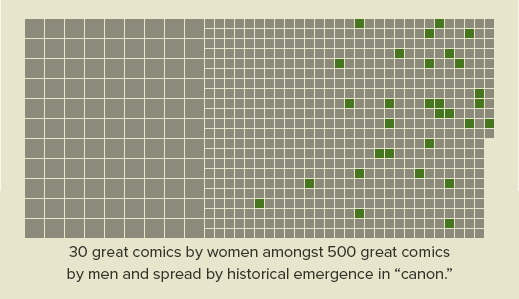
And it's not just female-created books that are disadvantaged by history. Even great books by male creators that have come out recently struggle against the weight of "canon." Books like Watchmen, Maus, and Dark Knight Returns continue to rule the roost even though more recent books like Duncan The Wonder Dog and Nao Of Brown and Building Stories are much better works.
But what else might be inhibiting my inclusion of more female-created titles? Probably a big factor is going to be targeted readership. While women are creating a ton more comics now than were two decades ago, the largest percentage of that production is going to be in market categories that don't generally interest me. Female creators are booming in the realm of autobio and YA/middle grade books. Autobio doesn't usually interest me for reasons I've gone into elsewhere and YA books are geared toward readers much younger than I. So I'm simply not consuming a lot of likely quality books by women simply because, like superhero books, they don't much intersect with my interests. (Of course there are going to be exceptions—both Cross Game and On A Sunbeam hit me right in the heart despite being targets at a YA-like demographic.)
And that's fine. I love that these creators are creating work for an audience that isn't middle-aged white men (like me). But that does make it harder for me to find/read/enjoy many of these books. Case in point, while I've had all four omnibus volumes of Chi's Sweet Home, and my kids adore it and have read it at least 10 times through, I still haven't actually read the book. It just doesn't intersect my interests closely enough for me to jump at giving it a read.
Good Ok Bad features reviews of comics, graphic novels, manga, et cetera using a rare and auspicious three-star rating system. Point systems are notoriously fiddly, so here it's been pared down to three simple possibilities:
3 Stars = Good
2 Stars = Ok
1 Star = Bad
I am Seth T. Hahne and these are my reviews.
Review copy submission may be facilitated via the Contact page.
Browse Reviews By
Other Features
- Popular Sections:
- Top 100
- Top 75 by Female Creators
- Kids Recommendations
- Daily Recommendations
- What I Read: A Reading Log
- Best Books of the Year:
- Top 75 of 2017
- Top 75 of 2016
- Top 75 of 2015
- Top 75 of 2014
- Top 35 of 2013
- Top 25 of 2012
- Top 10 of 2011
- Other Features:
- Why I ❤ Zita the Spacegirl
- 31 Days of Comics
- Bookclub Study Guides
- Sitemap

